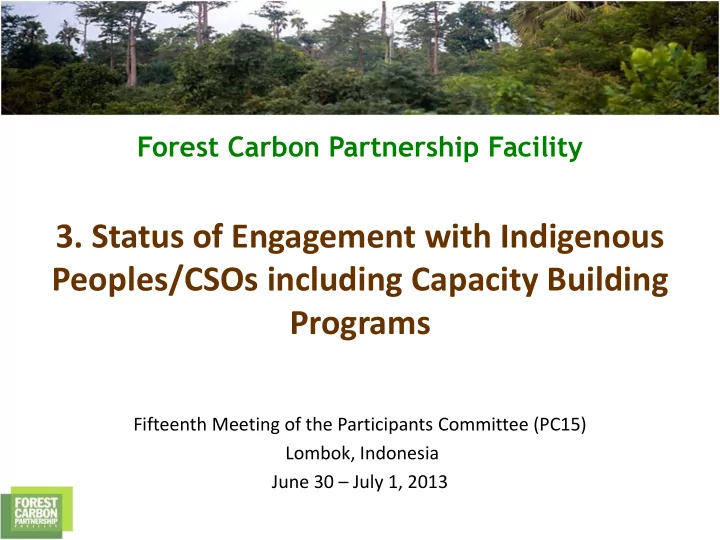

Forest Carbon Partnership Facility 3. Status of Engagement with Indigenous Peoples/CSOs including Capacity Building Programs Fifteenth Meeting of the Participants Committee (PC15) Lombok, Indonesia June 30 – July 1, 2013
Overview Update on Dialogues and Meetings with Indigenous Peoples and Civil Society Status of Capacity Building Programs for FY12-13 Progress on Transition to New Grant System for FY14-15 2
Engagements and Dialogues Mainstreaming of FCPF engagement into broader processes and platforms Event at the 12th Session of the UN Permanent Forum on Indigenous Peoples showcased capacity building program Integration of FCPF indigenous peoples’ engagement with World Bank consultations, led by WB Indigenous Peoples Advisor 3
CB Programs FY12-13: Progress Update Africa & Asia-Pacific: Review of spontaneous proposals received • Proposals implemented in FY12: $174 950 • Proposals accepted in FY13: • Kenya: MPIDO (IP) • Nepal: NEFIN (IP), DANAR (CSO), Nepal Law Society (CSO) • Regional: Kenya, Uganda, Tanzania: PACJA (CSO) LAC: Call for proposals • 20 Expressions of Interest • 15 Shortlisted • 9 Awards (Instituto del Bien Comun; Asociación SOTZIL; Fundacion para la Promocion del Conocimiento Indígena; Stichting Bureau VIDS; Red Indigena de Turismo de Mexico; Derecho, Ambiente y Recursos Naturales (DAR);Organizacion de Jovenes Embera y Wounaan de Panama (OJEWP); Red Mexicana de Organizaciones Campesinas Forestales Challenges: • Need for deviations from standard Bank Procedures causing administrative delays • New system will address some of these procedural constraints
CB Programs FY14-15(2) Selection Criteria: • An Indigenous Peoples’ organization/ Southern CSO • Credibility with peers and an established institutional structure with a solid track record in issues related to forestry, climate change and/or REDD+ • Experience working effectively with other regional organizations • Capacity for effective financial management and procurement • Capacity to undertake environmental and social screening and ensure compliance with WB safeguard policies and procedures • Capacity to address grievances and provide a redress mechanism Expressions of Interest • Africa: 3 IP and 3 CS organizations • Asia-Pacific: 1 IP and 1 CSO • LAC: 2 IP and 2 CSO 5
Selected Organizations MPIDO (IP/Africa) PACJA (CSO/Africa) Tebtebba (IP/Asia) ANSAB (CSO/Asia) Sotz’il (IP/Latin America) ACICAFOC (CSO/Latin America) 6
MPIDO Mainyoito Pastoralists Integrated Development Organization was established in 1996 as a result of marginalization of Maa pastoralists in Kenya. MPIDO has been an leader on Indigenous Peoples rights in Africa, and manages programs on human rights, livelihoods and natural resource management in East Africa. 7
PACJA The Pan African Climate Justice Alliance is a coalition of some 300 African NGOs, and is the continent’s primary civil society platform for climate change issues. 8
Tebtebba The Indigenous Peoples’ International Centre for Policy Research and Education is an indigenous peoples’ organization born out of the need for heightened advocacy to have the rights of indigenous peoples respected, protected and fulfilled worldwide. 9
ANSAB Established in 1992, the Asia Network for Sustainable Agriculture and Bioresources is committed to biodiversity conservation and livelihood improvement in South Asia. It places community empowerment and economic incentives at the heart of its approach. 10
Sotz’il Sotz’il (“bat” in Kaqchikel) is a Mayan organization based in Guatemala, whose aim is sustainable indigenous development, and which manages programs on community development, land rights and climate change. 11
ACICAFOC The Coordinating Association of Indigenous and Community Agroforestry in Central America is a non-profit, social community-based organization from Central America, which groups associations, cooperative societies, federations and grass roots organizations led by small and medium agro forestry producers, indigenous peoples and farmer peasants. 12
Program Structure 13
Eligible Activities Research and policy work on land tenure, social and environmental issues; Sustainable livelihoods; Good governance; Training, outreach and awareness building; Analytical and design work on benefit sharing and grievance redress mechanisms; Mapping of indigenous or community land use; Support for multi-stakeholder dialogues and collaboration between government, Forest- Dependent Peoples and Southern CSOs, respectively; Other activities contributing to the national Strategic Environmental and Social Assessment (SESA); and Community-level monitoring of and reporting on various aspects of the overall REDD+ process (to enhance transparency/accountability). 14
Next Steps Project Development: Draft of project concept to be shared and discussed with intermediaries at workshop, tentatively planned for August. Due Diligence: Preparation and review of Integrated Assessment Framework (IAF) for analysis of fiduciary and safeguards capacities of intermediaries. Country No-Objection: FMT discussing different options for this requirement. 15
Terima Kasih! http://www.forestcarbonpartnership.org/capacity-building-forest-dependent-people-redd-1 16
Recommend
More recommend